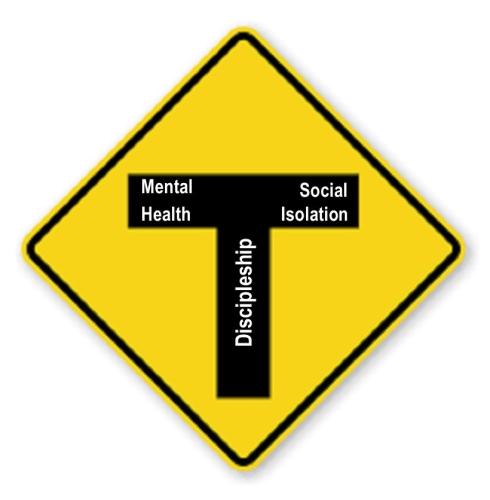
Social Isolation, Mental Health, and Discipleship
On November 21, 2018 I had the privilege to receive a phone call from CBC Radio inquiring about an event we co-hosted back in April: “Where Discipleship Meets Mental Health and Social Isolation.” CBC Radio was hosting a series on loneliness. Jason De Soussa, interim host of “BC Today,” asked great questions that I would like to answer in more detail (Podcast Here – Minute 25).
Question 1: Tell us about this seminar
On April 21 2018 Missions Fest Vancouver and Sanctuary Mental Health partnered to host a seminar: “Where Discipleship Meets Mental Health and Social Isolation.” Ward Memorial Baptist Church (one of Missions Fest’s partner churches) kindly hosted the event.
This seminar initiative was partly a response to the Vancouver Foundation question: How can faith communities better organize themselves to help create a more connected Vancouver?
The workshop was in preparation for the 2019 Missions Fest Conference theme: “Mission: Discipling.” The purpose was to facilitate reflection and action around the intersection between Mental Health and Social Isolation and to see how Jesus’ call to “missional discipleship” is good news for these deeply concerning realities of our society. Specific details of the workshop can be found in the event recap posting.
Question 2: What are some of the issues you’ve been hearing about?
Some of the issues I’ve heard are feelings of entrapment in a downward spiral of loneliness that create/worsen mental and physical health challenges. For example, a young accomplished professional who has a stressful work environment that leaves him with almost no time or energy to socialize and to look for that ‘special’ person to commit his life to. This leaves him “depressed” (his words) and developing an excessive drinking problem to cope with the stress and the pain of loneliness. Another accomplished professional lady who despite her deep connection to God, feels “stuck” in her social isolation and dissatisfaction due to an overly demanding job and no “significant relationships” in her life. She feels she has no options, but to keep working. Another very common experience is that a person that gets diagnosed with depression or bipolar disorder often loses community as a result.
Question 3: The hardest part is to start the conversation about feeling isolated. How can we spark that conversation?
Yes, starting a conversation where people feel safe and brave to disclose feeling of loneliness is very difficult. The place to start is in small groups. The way to start is the Jesus way. His way is through vulnerability and risk. The small group leader needs to model both and take the risk of being vulnerable.
Christian faith communities have ancient wisdom and practices to resist social isolation. First, feelings of loneliness are part of the human experience. So, it is “ok” or “normal” to feel alone. Feelings of loneliness are a sign of the “eternity” that God has put in each human heart. Our loneliness or sense of incompleteness points us to another dimension and to a future order on this earth. Loneliness can help us understand that nothing in this world, no accomplishment, no activity, no possession, or relationship(s) will ever fully satisfy or complete our lives. Only God can. Through Jesus, God inaugurated a new order on this earth, called God’s Kingdom. However, this new order is not fully present yet. One day it will be. Until then our hearts long and realize our incompleteness. When that day comes, when God fully brings his perfect order and harmony to the whole earth (God’s Shalom) then our hearts will find ultimate fulfillment.

Second, Jesus modeled how to develop meaningful and long-lasting relationships. His life revolved around three loves: “UP, IN, OUT.” This has been one way to represent “Missional Discipleship” in a nutshell. “UP”, Jesus always spent time with His Father in prayer. From His Father, he drew his sense of identity, strength and purpose. He remained in his Father's love and transferred it to others. “IN”, Jesus called specific people to be “in” community with him and to share life with him daily. Those were his disciples. Together they walked, learned, ate, prayed, and worked together. Despite the many times his disciples let Jesus down, He did not give up on them. He modeled commitment. Eventually these 12 imperfect men, (except one, Judas), transformed their worlds and planted other Christian communities for the blessing of the nations. And finally, “OUT,” Jesus and his disciples where not just about having a clique of “close buddies,” but together they lived their lives with a purpose. Their mission was to announce God’s new order that came through Jesus, and to bring healing to the sick, food for the hungry, forgiveness for the oppressed, and deliverance for the captives.
So, Jesus has called us to live and share our lives with small groups of people, who together aim to be people of vulnerability and risk that draw their sense of identity and purpose from the God of love. In many churches these groups are called: life groups, home groups, bible study groups, small groups, cell groups, and others. Ideally these are people who gather at least weekly to connect with God in prayer, to learn God’s wisdom in the Bible, to share vulnerably about their life challenges and joys, to check on each other, to be there for each other, and to meet the needs of others beyond their group. These ‘small groups’ approach has developed in wonderful and unique ways locally and globally.
Question 4: Religion doesn’t always resonate with everyone in the same way, what advice do you have to people who are not religious to create those connections?
That is true, “Religion” sparks all sorts of associations in people, so not everybody sees the value in it. My advice for people to whom religion may not be the “thing” they go to when struggling with loneliness, would be: First, identify your source of identity and acceptance. Find what is the foundation of your life that makes you secure enough to reach out and engage. Second, instead of aiming to be an “independent” person, as Western values suggest, aim to be a “dependable” person in whichever group you are part of. If you are part of a sports group, an “after work drinks” group, a board, or a volunteer team, aim to show up, to be there and when possible, consider extending hospitality to others; sharing food is always a good idea. Regular and deeper conversations help to develop a sense of belonging. Going deeper rather than wider in our social lives is the way towards meaningful connections. And finally, discover your sense of purpose, and connect with others around a shared sense of purpose. In other words, discover your vocation, which can be defined as that place where the best of you meets the deepest needs of this world. Volunteering in a good cause is a great first step to give of yourself and to develop new meaningful connections. We humans were meant to find meaning and joy when we give ourselves to something bigger than us.
I want to conclude by calling all “religious people” to become better listeners. By “religious” I mean those of us who aim to be followers of Jesus. Let’s aim to listen to the issues in our society, in our neighbourhoods, and workplaces. For the last few years social isolation has been a deep concern. It increases our odds for an early death by 45% - more than excessive drinking, obesity or air pollution. Social isolation is "the main obstacle" to addressing poverty and housing issues in our city, according to the 2012 Vancouver Foundation report. CBC Radio and the Vancouver Foundation among others, have been doing a great job in bringing this issue as a topic for open conversations, which is the first step towards its de-stigmatization. In 2012 the Vancouver Foundation asked: How can faith communities help to create a more connected Vancouver? A more connected BC? Christian faith communities can help create a more connected Vancouver and BC by truly being who Jesus called us to be: His body, his hands, and feet to reach our city, one neighbour at the time. Let’s love God and love our neighbours. Also, we have the greatest sociological advantage! No other social institution is spread throughout society in a way that churches are. We can open our doors to a hurting world and simply be a connecting point. And, when the opportunity presents itself, share the love of Jesus in word and deed. Providing opportunities to re-connect with our Creator is the first step towards social fulfillment.







